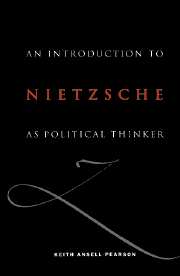Book contents
- Frontmatter
- Contents
- Acknowledgements
- Note on the texts and abbreviations
- Chronology of Nietzsche's life
- Introduction
- A note on Nietzsche and liberalism
- I THE QUESTION OF NIETZSCHE
- II ANCIENTS AND MODERNS
- III MAN AND OVERMAN
- 5 Zarathustra's teaching of the overman
- 6 A genealogy of morals
- 7 O humanity! Nietzsche on great politics
- IV THE QUESTION OF NIETZSCHE NOW
- Notes
- Bibliography
- Guide to further reading
- Index
7 - O humanity! Nietzsche on great politics
Published online by Cambridge University Press: 10 November 2009
- Frontmatter
- Contents
- Acknowledgements
- Note on the texts and abbreviations
- Chronology of Nietzsche's life
- Introduction
- A note on Nietzsche and liberalism
- I THE QUESTION OF NIETZSCHE
- II ANCIENTS AND MODERNS
- III MAN AND OVERMAN
- 5 Zarathustra's teaching of the overman
- 6 A genealogy of morals
- 7 O humanity! Nietzsche on great politics
- IV THE QUESTION OF NIETZSCHE NOW
- Notes
- Bibliography
- Guide to further reading
- Index
Summary
Humanity! Has there ever been a more hideous old woman among old women – (unless it were ‘truth’: a question for philosophers)?
Nietzsche, The Gay Science 377I should hate to come before my fellow men in the guise of a prophet, a monster, and a moral scarecrow.
Nietzsche, letter to Peter Gast (October 1888)I do not challenge individuals – I challenge humanity … However the judgement may fall, for or against me, my name is linked up with a fatality the magnitude of which is unutterable.
Nietzsche, letter to his sister (December 1888)Nietzsche's response to the problem of nihilism, and the crisis of authority it gives rise to, is a complex one. He devises the figure of Zarathustra to represent the ‘self-overcoming of morality’ and to teach the meaning of the overman. He inquires into the origins and descent of moral values and legal notions in order to combat a Christian and moral reading of history and man's evolution. I would argue that there are essentially two kinds of politics Nietzsche offers his readers. One is a less well-known ‘politics of survival’, which consists not in legislating new values and law-tables for man, but in playing in parodic and ironic fashion with the ideals of humanity. Here Nietzsche does not foresee a simple solution or end to nihilism, but devises strategies for its endurance. The other is the more familiar ‘politics of cruelty’ associated with Nietzsche's aristocratic radicalism. Here the aim is to gain control of the forces of history and produce, through a conjunction of philosophical legislation and political power (‘great polities’), a new humanity.
- Type
- Chapter
- Information
- An Introduction to Nietzsche as Political ThinkerThe Perfect Nihilist, pp. 147 - 162Publisher: Cambridge University PressPrint publication year: 1994
- 1
- Cited by



